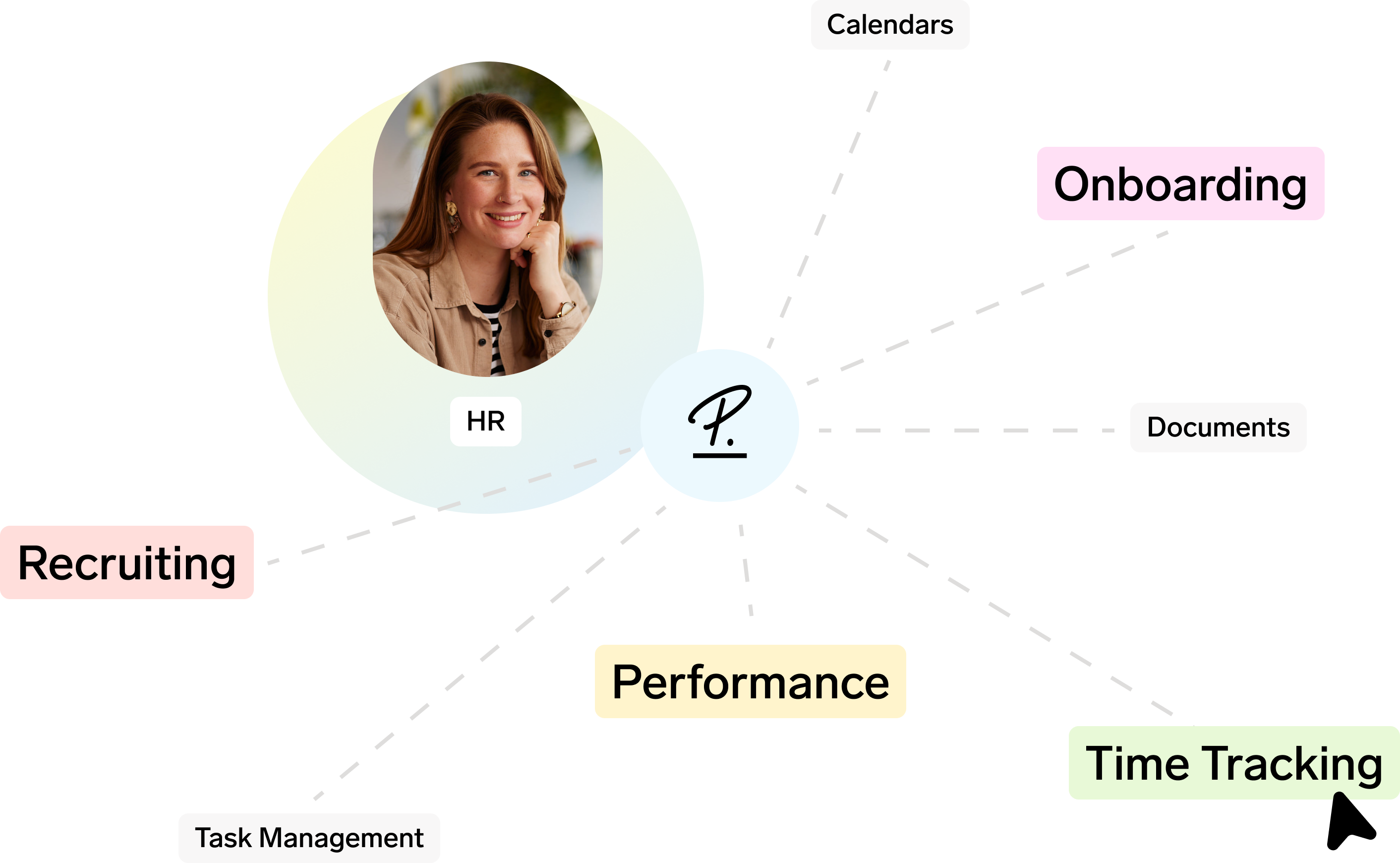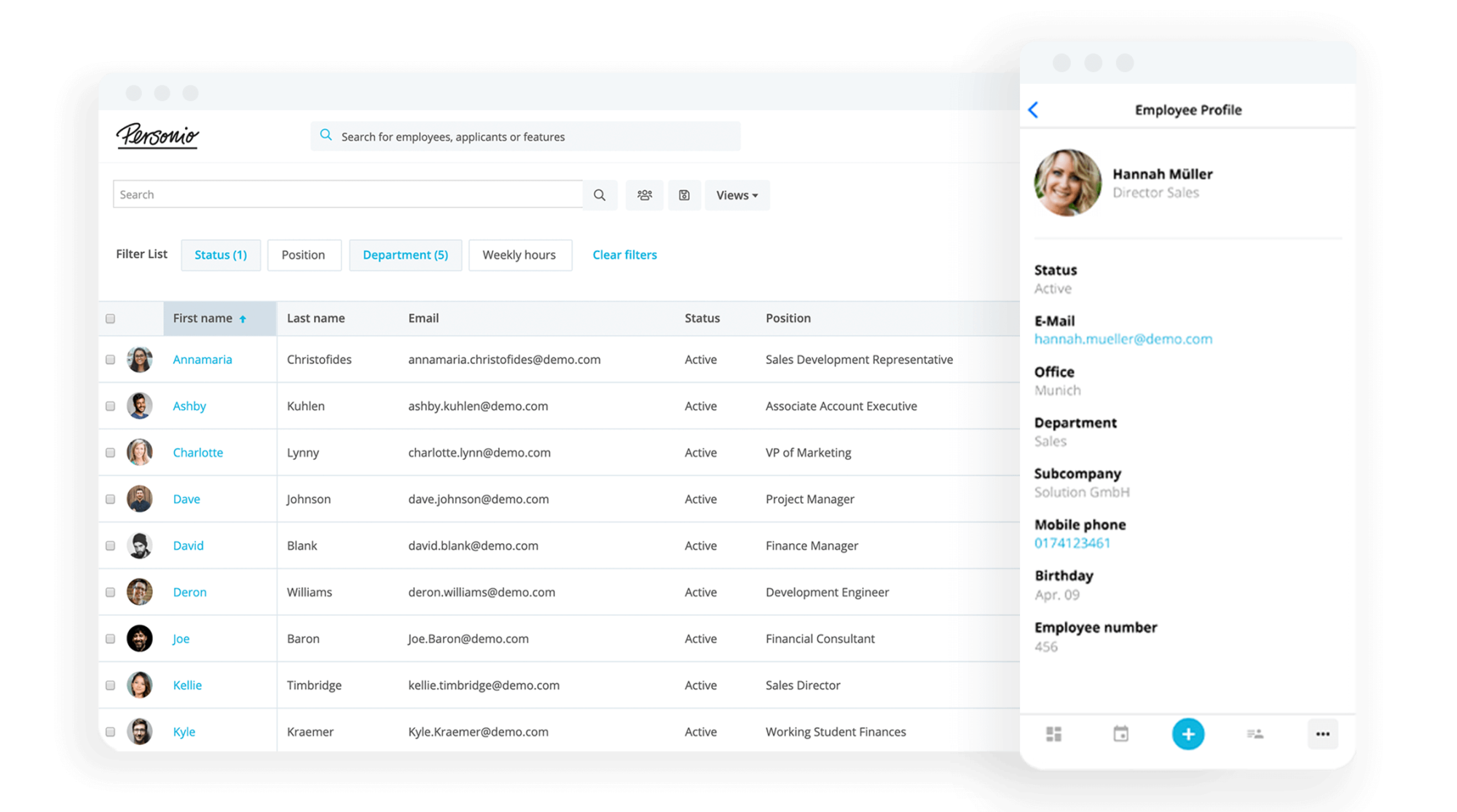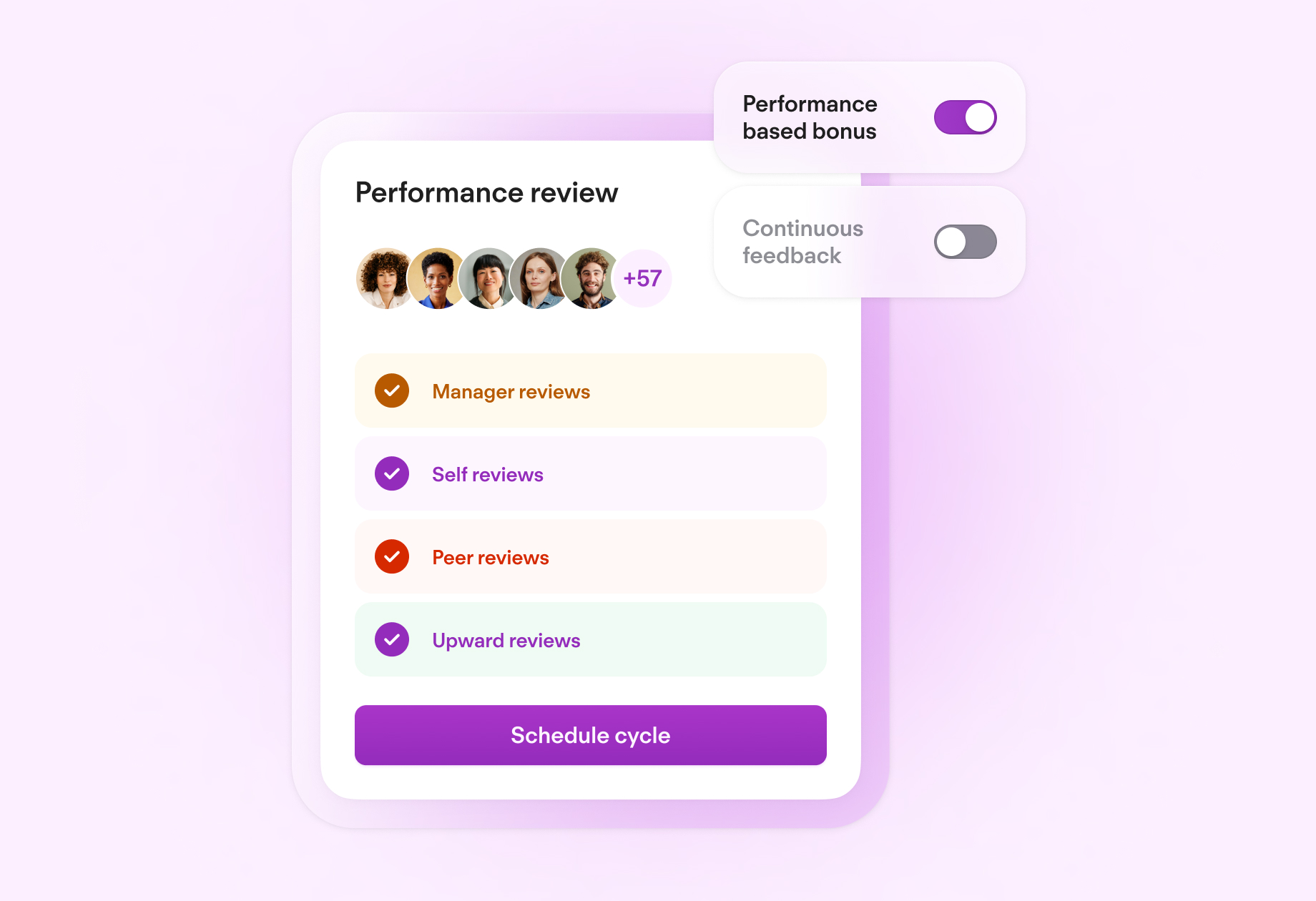
Automate Your HR Admin Tasks
Build accelerated, automated HR processes throughout your organisation – unlock the time you need to focus.
Discover Personio's AutomationUnderstanding the HR Generalist Role: A Deep Dive

In the ever-evolving landscape of modern business, the role of a Human Resources (HR) Generalist has become increasingly significant. Acting as the linchpin between management and employees, they ensure a harmonious and productive work environment.
But what does it really take to excel in this multifaceted role? In this article, we'll dive into the essential qualifications, skills and competencies that set apart top-performing HR Generalists from the rest.
Key facts
An HR Generalist is a pivotal role in Human Resources. They are responsible for a wide range of functions to support an organisation's HR strategy, serving as a point of contact for employees and management.
The key roles and responsibilities include recruiting, onboarding, compensation and benefits management, performance reviews, policy enforcement, conflict resolution and providing HR advice to both managers and employees.
To excel as an HR Generalist, individuals need strong communication, problem-solving, analytical and technological skills, along with a deep understanding of employment laws and regulations.
Contents
- 1What is an HR Generalist?
- 2What are the roles and responsibilities of an HR Generalist?
- 3HR Generalist skills and competencies
- 4How to recruit an HR Generalist
- 5Performance management for an HR Generalist
- 6HR Generalist vs. HR Manager
- 7The role of an HR Generalist in supporting organisational success
- 8Frequently Asked Questions about HR Generalists
What is an HR Generalist?
An HR Generalist is a crucial role within the field of Human Resources. This position involves a wide range of responsibilities and functions that contribute to the overall HR strategy of an organisation. As an HR Generalist, individuals serve as a point of contact for both employees and management, providing expertise and support in various HR areas.
What are the roles and responsibilities of an HR Generalist?
The roles and responsibilities of an HR Generalist are extensive and varied. They encompass numerous HR functions that play a critical role in creating a productive and amicable work environment.
Some key responsibilities include:
Recruiting and hiring new employees
Onboarding new employees and providing them with training
Developing and implementing employee compensation and benefits programs
Managing employee performance and conducting performance reviews
Enforcing company policies and procedures
Resolving employee complaints and disputes
Providing HR advice and support to managers and employees
HR Generalists are responsible for fostering positive employee relations, resolving conflicts and aligning HR practices with organisational goals.
HR Generalist skills and competencies
The HR Generalist bridges the gap between management and employees, ensuring that the company runs smoothly and peacefully. To truly thrive in this role, individuals need to arm themselves with a specific set of qualifications and skills.
Educational background: A bachelor's degree is often considered essential. However, while having a degree is a significant step, it's worth noting that some positions might require further studies or a master's degree, which can offer more in-depth insights into specialised areas of HR.
Experience and exposure: Hands-on experience plays a pivotal role in shaping an HR Generalist's capabilities. It's where theoretical knowledge meets real-world scenarios. The richness of practical experience, be it from internships, part-time jobs or full-time roles offers a perspective that often complements academic learning.
Certifications: Acquiring specialised certifications can give an HR Generalist an edge. These certifications demonstrate a commitment to the field and provide expertise in specific areas, like employment laws or talent acquisition.
Key skills and competencies:
Communication: Being the nexus between employees and management, it's important to articulate clearly, listen actively and relay information effectively.
Problem-solving: Issues are part and parcel of an organisation. An HR Generalist should be adept at identifying problems and brainstorming solutions.
Analytical abilities: Data-driven decision-making is becoming increasingly important. Hence, the ability to analyse data, understand patterns and derive insights is key.
Attention to detail: From contracts to company policies, the devil is often in the details. A keen eye can prevent potential pitfalls.
Technological proficiency: In today's digital age, fluency in various HR software applications, databases and other digital tools is a must. These tools streamline HR processes, ensuring tasks like payroll, benefits administration and recruitment are handled with efficiency and accuracy.
Give Your HR Processes A Big Boost

By implementing an all-in-one HRIS that can store, manage and optimise your employee data. Discover Personio today.
Book Your Demo Today
How to recruit an HR Generalist
Recruiting the right HR Generalist is key to get right for the success of an organisation's HR department. When seeking suitable candidates, several factors should be considered. First and foremost, the qualifications and skills of the prospective HR Generalist need to align with the organisation's specific requirements.
HR Generalist interview questions
Conducting a thorough interview process is imperative when selecting an HR Generalist. To assess a candidate's suitability for the role, specific interview questions designed to test their competency should be asked.
Some common interview questions for HR Generalist candidates include:
1. How do you stay updated on changes in employment laws and regulations?
2. Can you describe a situation where you effectively resolved an employee relations issue?
3. How do you approach policy development and implementation within an organisation?
4. What strategies do you employ to foster positive employee relations and create a harmonious work environment?
5. What is your experience with HR softwares and tools?
HR Generalist salary in the UK
HR Generalist salaries in the UK can vary depending on factors such as experience, qualifications and the size of the organisation.
According to recent data from Glassdoor, the average annual salary for an HR Generalist in the UK ranges between £30,000 and £45,000. However, salaries may exceed this range based on factors including location, industry and specific responsibilities within the role.
It is important for organisations to research and evaluate market trends and salary benchmarks when determining the appropriate compensation for an HR Generalist.
Onboarding processes for an HR Generalist
A well-structured onboarding process makes all the difference when setting an HR Generalist up for success. During the onboarding phase, new HR Generalists should be provided with comprehensive information about the organisation's HR policies, procedures and practices.
They should receive training on relevant HR software and tools and be introduced to key personnel within the organisation. Assigning a mentor or buddy can help the induction process and provide guidance specific to the organisation's culture.
Performance management for an HR Generalist
Performance management is a cornerstone in evaluating the efficacy and contributions of any professional. For an HR Generalist, performance isn’t merely measured by the number of tasks accomplished, but by the quality, impact and long-term implications of their work.
Key performance indicators (KPIs) can be tailored to gauge their effectiveness, including:
Recruitment efficiency: This evaluates the time taken to fill a vacancy, the retention rate of new hires and the satisfaction levels of the hiring managers.
Employee satisfaction surveys: These offer insights into how well the HR Generalist addresses concerns, cultivates a positive work environment and fosters professional growth. The feedback obtained from these surveys is invaluable, providing both qualitative and quantitative data.
Compliance and training completion rates: An HR Generalist is often responsible for ensuring employees complete necessary training modules and adhere to regulatory requirements. A high completion rate indicates diligence in tracking and communicating these mandates.
Efficiency in handling employee relations issues: Metrics such as the time taken to resolve conflicts or grievances, can be a direct reflection of an HR Generalist's mediation and problem-solving skills.
Build a consistent performance review process at scale

Personio's all-in-one HR software allows busy HR teams to design, build and implement performance management cycles in a holistic and automated way. No more worrying about whether reviews happen. Instead, your team can focus on ensuring they're fair.
Learn about Performance with PersonioHR Generalist vs. HR Manager
While HR Generalists and HR Managers share similarities in their roles, several distinctions set them apart. HR Generalists often have a broader scope of responsibilities, covering various HR functions within an organisation. They provide support across a wider range of HR areas.
On the other hand, HR Managers typically hold more specialised and focused roles, such as employee relations, talent acquisition or compensation and benefits. HR Managers often possess more extensive experience and play a strategic role in developing and implementing HR initiatives. The hierarchical structure within organisations also differentiates these roles, with HR Managers often occupying higher-level positions compared to HR Generalists.
The role of an HR Generalist in supporting organisational success
HR Generalists encompass a diverse range of responsibilities within the field of Human Resources. With their comprehensive skills, competencies and expertise, HR Generalists serve as valuable assets in any organisation.
Their contributions in recruitment, employee relations, performance management and policy development contribute to a positive work environment and support organisational success. By understanding the qualifications and skills required for the role, organisations can recruit competent HR Generalists who will make a significant impact.
In order to achieve an even higher efficiency level within your HR processes, find out how Personio can assist you.
Frequently Asked Questions about HR Generalists
What does an HR Generalist do?
An HR Generalist plays a vital role in managing various facets of Human Resources, ranging from recruitment, employee relations and benefits administration, to ensuring legal compliance. They are the multitaskers of the HR world and are often the primary point of contact for employees in a company.
Is an HR Generalist better than an HR specialist?
Neither is inherently better; their roles simply differ. An HR Generalist has a broad understanding of multiple areas of HR, while an HR specialist focuses on one particular area, like recruitment or training. The choice between them depends on the specific needs of the organisation.
Which HR position is highest?
The highest HR position in most organisations is the Chief Human Resources Officer (CHRO) or HR Director. This role involves strategic planning and decision-making at the executive level, overseeing the entire HR department and ensuring that HR strategies align with organisational goals.
Disclaimer
We would like to inform you that the contents of our website (including any legal contributions) are for non-binding informational purposes only and does not in any way constitute legal advice. The content of this information cannot and is not intended to replace individual and binding legal advice from e.g. a lawyer that addresses your specific situation. In this respect, all information provided is without guarantee of correctness, completeness and up-to-dateness.
